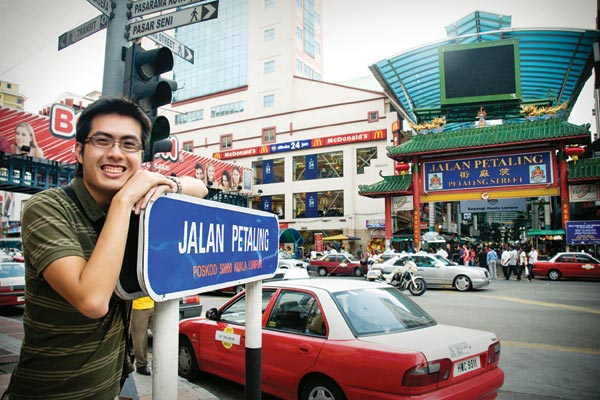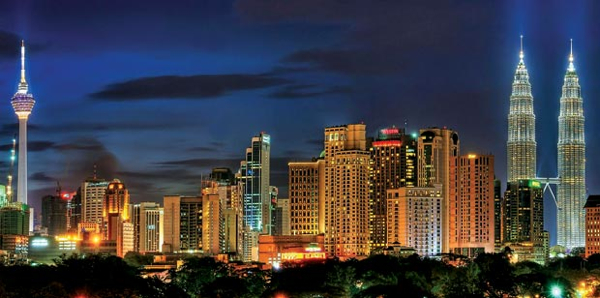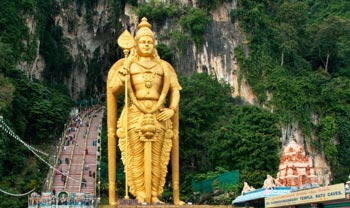Jet Set: Kuala Lumpur
Every month, Jet Set swoops down on a city providing all the relevant details to make your next visit click.
Kuala Lumpur, thy name is mud. Literally. Malaysia’s bustling capital derives its name from the Malay words meaning “muddy estuary” and “town”.
But if the country’s largest city ever had any dirt, it was wiped from its shoes long ago. Today, Kuala Lumpur, known simply as KL, is an economic nerve centre, home to enough of Southeast Asia’s industry leaders to earn the designation “global city” from economists and sociologists around the world. The title, given to only a handful of cities, including Tokyo, London and New York, identifies Kuala Lumpur as a major hub in the global economy.
The titans of finance, insurance, media and real estate all hold court here, eyeing the rest of the region from shiny office towers. None of those spires, of course, compare to the sky-tickling majesty of Petronas Towers, considered the tallest twin buildings on earth.
The city also enjoys a relatively modern tradition as a hive for sports events of every stripe, thanks to aggressive efforts to promote Kuala Lumpur to the international sporting community. In 1998, the Commonwealth Games came to town, while the Formula 1 World Championships makes a regular pit stop in neighboring Sepang. Last month alone, the city hosted an international dart tournament as well as a fishing festival that drew hundreds of the world’s top anglers, all casting a line for the Big One.
In hindsight, Kuala Lumpur’s push to brand itself as a sporting Mecca was shrewd – as seen during the Asian Financial Crisis of 1998. While the rest of the region languished in economic doldrums during that period, Kuala Lumpur actually saw an increase from 6.2 million tourists in 1997 to more than 10 million in 2000.
Kuala Lumpur draws an altogether different crowd with its cavalcade of conferences and conventions, from last month’s Sustainable Architecture and Urban Design forum to this month’s Malaysia International Shoe Festival.
It all adds up to an effervescent metropolis, teeming with capital and commerce, and an eye on the future.
Best way to get around
While the city’s core hosts nearly 2 million souls, the surrounding area, called Greater Kuala Lumpur, boasts a population of nearly 8 million – with many of those people swarming the downtown core every day. On average, that amounts to roughly 6,500 people sharing the same square mile.
City folk don’t let themselves get too carried away by public transit. Although the government has been encouraging people to make the switch to its extensive light rail system, only about a fifth of residents ride those rails.
The driving force in Kuala Lumpur transport is the car. No, you shouldn’t be expecting Bangkok’s tidy system of subways lines and sky trains. This is a city that rolls on its own wheels. And, more often than not, it’s a mess.
Your first breath of Malaysian air is likely to be had just as you’re leaving the gates of Kuala Lumpur International Airport, about 50km south of the city. In any case, if you want that fresh-country feeling to last a little longer, dodge the taxi drivers and pay 35 ringgits, or about $10 for the high-speed train, the KLIA Ekspres. Then pat yourself on the back for the 28-minute ride downtown.
Public transit is miles ahead of cars, even if the locals haven’t fully realised it yet. Traffic jams in Kuala Lumpur remain the stuff of legend.
Recharge
When it comes to accommodation, the business pack typically steers clear of the backpacker ghetto on Jalan Petaling (Petaling Street) in Chinatown. Brickfields is a smarter option, sidled up against the city’s main transit hub, KL Sentral. The area’s proximity to trains and all other modes of transit makes it a picture of convenience.
Nightlife isn’t much of a distraction here, as the pace gets pretty placid after sundown, save for the jangling rhythms of Indian songs coming from various Indian restaurants.
In Brickfields, Hotel Sentral is clean, efficient and probably one of the most convenient roosts from which to access the city. At about $40 per night to start, the rates will tickle your expense account.
If today’s Brickfields doesn’t seem quite rehabilitated enough for your needs, there’s always Bukit Bintang. The four-star Royale Bintang includes high-speed wireless internet and your very own minibar. Prices start at around $70.
The strictly business traveller may feel more at home in Cyberjaya. About 50km outside the city, this townlet forms a key cog in Malaysia’s much-vaunted ‘Multimedia Super Corridor’.
Best sightseeing
The towers, obviously. Touching down in Kuala Lumpur, even for a short time, without having a look at the Petronas Towers is kind of like a visit to Toronto, Canada without riding the elevator to the top of the CN Tower. Go on, be a tourist.
Best place to brunch
With food phenomenon Adi Radzi helming the kitchen, Hakka Republic Wine Bar and Bistro owns the modern brunch. It may sound Asian, but Hakka is consummately European from the beef Wellington right down to the eggs Benedict. This 50-seater is predictably packed on Sundays, so book ahead.
After dark
An island of shimmering whiteness in a concrete sea, 7 Ate Nine beckons the weary business traveller from its airy SkyLounge high atop the city skyline. Housed in the Ascott Hotel, 7 Ate Nine doesn’t play everything by numbers. From the so-called ‘ice bar,’ the in-house mixologist gets fairly funky with the mixes – and remixes. Opt for a classic mojito, or wade into the watermelon-infused version. Most of these fresh takes on old-school drinks will cost you about $7.50. The uncompromising business traveller will certainly reach for a bottle of 18-year-old, single malt Macallan at about $240 – and really start enjoying the view.
Sense and sensitivities
The art of the deal may be universal, but if your partners or clients happen to be Muslim – a very real probability in this mostly-Muslim country – you’ll need to observe a few rules of the road: Friday, as a vital Muslim prayer day, is never a good day for appointments. Many businesses also observe shorter hours.
Give and receive business cards with both hands, and don't put them straight into your pocket. Most Muslims don’t drink alcohol. But at a business lunch, it’s considered acceptable for non-Muslims to tip back a peg or two or... No, keep it at a peg.
What to pack
An empty piece of luggage. Malaysia is a shopper's paradise, and you might as well wrap up as many birthdays as you can. Home in on cheap electronics, clothing by the bushel and some genuine antiques in Central Market.
A raincoat. Malaysia’s weather is notoriously fickle. And when it rains, it really rains – leaving you, and that once crisp business suit, in ruins.
Republished with the Kind Permission of

- Login to post comments
- 22679 reads
- Printer-friendly version


